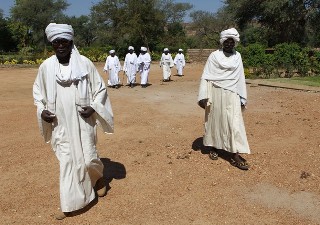South Sudan denies fresh clashes in Abyei between Dinka Ngok and Misseriya
July 11, 2012 (WAU) – South Sudan on Wednesday denied reports that fighting broke out between members of the Misseriya and Dinka Ngok ethnic groups in Abyei on Monday.
Sudan’s official news agency reported two days ago that Dinka Ngok attacked some Misseriya traders in Abyei market and wounded two of them. The agency praised the swift intervention of the Ethiopian peacekeepers who repelled the assailants.

“There was no fighting between Misseriya and Dinka Ngok. Misseriya are not in the area. They are moving back with their cattle. What happened was just an isolated incident provoked by a misunderstanding. It was handled right away by United Nations Security Interim Force for Abyei [UNISFA]”, Deng said on Wednesday.
Deng claimed that a former member of Khartoum’s Sudan Armed Forces (SAF) 31st brigade, which Juba accused of instigating the 2008 Abyei clashes, defied residents requests to close their shop in respect for the independence celebrations.
Abyei is a disputed area between north and South Sudan. A stipulation of the peace agreement which ended the civil war in 2005 was that the people of Abyei be afforded the opportunity to decide between joining the new state of South Sudan or to remain in Sudan. Dispute over voter eligibility has left the poll on hiatus. A particular sticking point is the participation of the Misseriya; nomads who want to maintain the region within Sudan.
Armed conflict in broke out in the region in May 2011 when 5,000 SAF troops reportedly took control of the region after three days of conflict after an ambush by South Sudanese troops, displacing 100,000 people. To stabilise the security situation the UNISFA was deployed.
Progress has been made with both Juba and Khartoum recently agreeing to withdraw its troops. However, Juba alleges that clandestine SAF troops remain in the region.
Although Juba “regret[s]” the incident, according to Deng, its roots are in Abyei’s post-conflict atmosphere. He said that “our people are traumatized” and that when they see “those who committed atrocities” still amongst their community, tensions arise.
“We have agreed to resolve a number of issues in the meeting we had in Abyei last week. We have agreed on a number of issues to be implemented,” said Deng, explaining that the Misseriya are starting to realise the importance of living peacefully.
The people of Abyei have been returning to the region since the security situation has improved, the numbers for which are still unclear but there is concern about the capacity of NGOs to accommodate a potential influx in the run-up to the rainy season.
(ST)
